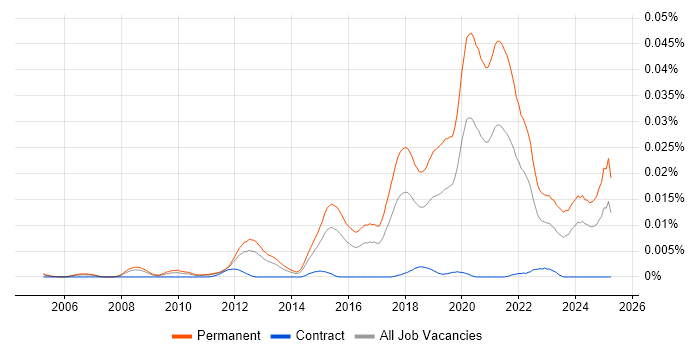Mid Level Software Engineer
UK > England
The median Mid Level Software Engineer salary in England is £47,500 per year, according to job vacancies posted during the 6 months leading to 3 May 2025.
The table below provides salary benchmarking and summary statistics, comparing them to the same period in the previous two years.
| 6 months to 3 May 2025 |
Same period 2024 | Same period 2023 | |
|---|---|---|---|
| Rank | 645 | 828 | 912 |
| Rank change year-on-year | +183 | +84 | +167 |
| Permanent jobs requiring a Mid-Level Software Engineer | 10 | 15 | 18 |
| As % of all permanent jobs advertised in England | 0.022% | 0.018% | 0.019% |
| As % of the Job Titles category | 0.024% | 0.019% | 0.021% |
| Number of salaries quoted | 8 | 13 | 15 |
| 10th Percentile | £36,875 | - | £33,000 |
| 25th Percentile | £42,500 | £42,500 | £41,250 |
| Median annual salary (50th Percentile) | £47,500 | £50,000 | £45,000 |
| Median % change year-on-year | -5.00% | +11.11% | +5.88% |
| 75th Percentile | £85,000 | £52,500 | £60,000 |
| 90th Percentile | - | £66,250 | £63,750 |
| UK median annual salary | £47,500 | £47,500 | £50,000 |
| % change year-on-year | - | -5.00% | +8.11% |
All Permanent IT Job Vacancies
England
For comparison with the information above, the following table provides summary statistics for all permanent IT job vacancies in England. Most job vacancies include a discernible job title that can be normalized. As such, the figures in the second row provide an indication of the number of permanent jobs in our overall sample.
| Permanent vacancies in England with a recognized job title | 41,862 | 80,543 | 84,589 |
| % of permanent jobs with a recognized job title | 90.30% | 94.48% | 91.52% |
| Number of salaries quoted | 24,654 | 60,279 | 53,593 |
| 10th Percentile | £30,000 | £28,500 | £32,626 |
| 25th Percentile | £42,500 | £38,250 | £45,000 |
| Median annual salary (50th Percentile) | £57,500 | £53,500 | £60,800 |
| Median % change year-on-year | +7.48% | -12.01% | +1.33% |
| 75th Percentile | £75,000 | £71,942 | £82,500 |
| 90th Percentile | £97,500 | £91,000 | £100,000 |
| UK median annual salary | £57,500 | £52,550 | £60,000 |
| % change year-on-year | +9.42% | -12.42% | - |
Mid-Level Software Engineer
Job Vacancy Trend in England
Job postings that featured Mid-Level Software Engineer in the job title as a proportion of all IT jobs advertised in England.

Mid-Level Software Engineer
Salary Trend in England
3-month moving average salary quoted in jobs citing Mid-Level Software Engineer in England.
Mid-Level Software Engineer
Salary Histogram in England
Salary distribution for jobs citing Mid-Level Software Engineer in England over the 6 months to 3 May 2025.
Mid-Level Software Engineer
Job Locations in England
The table below looks at the demand and provides a guide to the median salaries quoted in IT jobs citing Mid-Level Software Engineer within the England region over the 6 months to 3 May 2025. The 'Rank Change' column provides an indication of the change in demand within each location based on the same 6 month period last year.
| Location | Rank Change on Same Period Last Year |
Matching Permanent IT Job Ads |
Median Salary Past 6 Months |
Median Salary % Change on Same Period Last Year |
Live Jobs |
|---|---|---|---|---|---|
| London | +107 | 3 | £80,000 | +28.00% | 7 |
| North of England | +70 | 3 | £43,750 | -2.78% | |
| South East | +101 | 2 | £47,500 | +35.71% | 3 |
| Yorkshire | +73 | 2 | £45,000 | - | |
| East of England | +49 | 2 | £35,000 | -28.21% | 1 |
| North West | +25 | 1 | £42,500 | -15.00% | |
| Mid-Level Software Engineer UK |
|||||
Mid-Level Software Engineer Skill Set
Top 30 Co-occurring Skills and Capabilities in England
For the 6 months to 3 May 2025, Mid-Level Software Engineer job roles required the following skills and capabilities in order of popularity. The figures indicate the absolute number co-occurrences and as a proportion of all permanent job ads across the England region featuring Mid-Level Software Engineer in the job title.
|
|
Mid-Level Software Engineer Skill Set
Co-occurring Skills and Capabilities in England by Category
The follow tables expand on the table above by listing co-occurrences grouped by category. The same employment type, locality and period is covered with up to 20 co-occurrences shown in each of the following categories:
|
|
||||||||||||||||||||||||||||||||||||||||||||||||||||||||||||||||||||||||||||||||||||
|
|
||||||||||||||||||||||||||||||||||||||||||||||||||||||||||||||||||||||||||||||||||||
|
|
||||||||||||||||||||||||||||||||||||||||||||||||||||||||||||||||||||||||||||||||||||
|
|
||||||||||||||||||||||||||||||||||||||||||||||||||||||||||||||||||||||||||||||||||||
|
|||||||||||||||||||||||||||||||||||||||||||||||||||||||||||||||||||||||||||||||||||||
